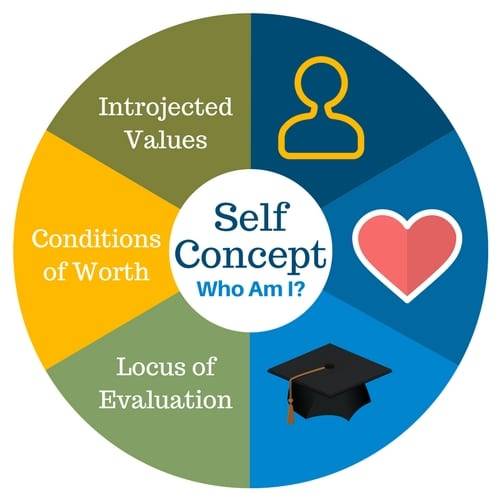Self-concept is the totality of how a person views and perceives themselves, including their strengths, weaknesses, values, beliefs, and opinions. It is the knowledge and understanding we have of ourselves, which helps us to form our views and opinions of the world. It is shaped by a person’s interactions with family, friends, and society, and it is constantly evolving as one learns and develop new skills.
Components of Self-concept
According to Carl Rogers (an American Psychologist), there are three main components of self-concept.
Self-image: Self-image is the way we see ourselves. Self-image includes what we know about ourselves physically (e.g., dark hair, brown eyes, short, girl), our social roles (e.g. wife, brother, doctor), and our personality traits (e.g. outgoing, serious, kind, ).Self-image doesn’t always match reality. Some individuals hold an inflated perception of one or more of their characteristics. These inflated perceptions may be positive or negative, and an individual may have a more positive view of certain aspects of the self and a more negative view of others.
Self-esteem: Self-esteem is the value we place upon ourselves. Individual levels of self-esteem are dependent on the way we evaluate ourselves. Those evaluations incorporate our personal comparisons to others as well as others’ responses to us. When we compare ourselves to others and find that we are better at something than others and/or that people respond favorably to what we do, our self-esteem in that area grows. On the other hand, when we compare ourselves to others and find we’re not as successful in a given area and/or people respond negatively to what we do, our self-esteem decreases. We can have high self-esteem in some areas ("I am a good student") while simultaneously having negative self-esteem in others ("I am not well-liked")
Ideal-self: The ideal self is the self we would like to be. There’s often a difference between one’s self-image and one's ideal self. This incongruity can negatively impact one’s self-esteem.
According to Carl Rogers, self-image and ideal self can be congruent or incongruent. Congruence between the self-image and ideal self means that there is a fair amount of overlap between the two. While it is difficult, if not impossible, to achieve perfect congruence, greater congruence will enable self-actualization. Incongruence between the self-image and ideal self means there’s a discrepancy between one’s self and one’s experiences, leading to internal confusion (or cognitive dissonance) that prevents self-actualization.




No comments yet
Be the first to share your thoughts!